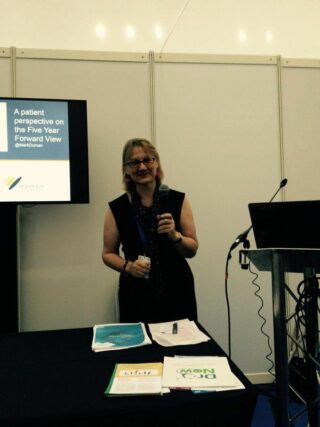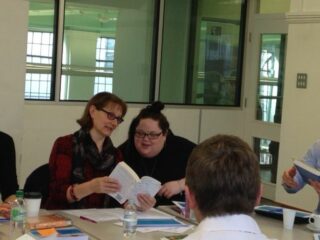Mandy’s experience includes working in a variety of settings as a mental health nurse for 15 years, and also for the past 14 years as a carer for her son. She is a team player who passionately believes in Co-Production and has successfully established a variety of support groups within the community, by co-designing them with service-users. She invites people to contact her to join the new Q Co-Production special interest group.
How – and why? – did you first get involved in improvement; and what has been your journey since then?
I have been a carer for my son who has Cystic Fibrosis (CF) for the past 16 years. My son has had over 250 appointments and hospital visits in that time. Despite being very grateful for the treatment he receives, I have become aware of the need to improve and change the way health and social care is delivered. I have basically become a Change Agent.
My journey has been challenging, rewarding, fascinating and frustrating
I therefore got involved in various Patient and Public Voice roles, the first of which was as a Lay Member on the Clinical Reference Group for Cystic Fibrosis. This involved improving care by drawing up Service Specifications. Although this felt like a great achievement, the improvement was not reflected on the ground, as many CF centres remained unaware of the specifications and many centres are still unable to fulfil them. This raises questions about how to motivate and enable the implementation of improvements.

Since then my journey has been challenging, rewarding, fascinating and frustrating. I have now reached the dizzy heights of being an ‘Expert by Experience’ on the Five Year Forward View People and Communities Board. I am also a member of the Co-Production Group in the Coalition for Collaborative Care, and a Patient Partner on the NHS Patient and Public Participation Oversight Group. I never expected to find myself in these roles, and I have ended up where I am due to the evolution of my passion for a more egalitarian culture between patient/citizens and clinicians.
As the photos show, I have chaired pop-up sessions at NHS Expo, and I have recently been involved in co-producing the ‘Reading Well’ scheme for people with long-term conditions.
What most inspires you professionally?
There is one word which has changed my life and given me a sense of hope: Co-Production. It epitomises the values and culture which I passionately believe are the only way forward for health and social care. As a member of the Co-production Group in the Coalition for Collaborative Care, I have been involved in designing ‘The Co-Production Model’.
‘Co-production is a way of working that involves people who use health and care services, carers and communities in equal partnership’.
This can apply to design of services and to the planning of an individual careplan. For example, my son’s Cystic Fibrosis requires a relentless treatment burden which impacts hugely on his everyday life. However, there is more to his life than Cystic Fibrosis. He has learnt to manage his condition in ways which don’t fit into a textbook and don’t fit into generalised charts. It sometimes feel as though, as soon as he walks into a hospital, he becomes a patient who has be measured in various ways. He then has things done to him to make sure he fits into the required measurements and data.
To improve the healthcare system we have to treat patients and their families as the experts which they are.
The kind of improvement my son would like to see is to stop spending hours attending hospital appointments that aren’t necessary. We often get home from a check-up and say to each other: ‘we could have done that from home’. He could talk to the doctor on Skype; he could weight himself; he could easily be trained to do his own lung function test. To improve the healthcare system we have to treat patients and their families as the experts which they are. They generally know what is important to them and what will be a complete waste of time and money. They know what will improve their experience of healthcare better than anyone. Many projects waste time and money by starting from inaccurate assumptions about what people want.
But co-production is messy. It’s where we challenge the existing culture and power dynamic, it’s where we throw the existing rigid systems up in the air and get creative, it’s where we have a better conversation between patient and clinician and it’s where the magic happens.
Alongside this, the other inspiring experience has been my involvement in The School for Change Agents. This has taught me how to be a successful change agent in healthcare and how to draw on networks to strengthen my impact. It has made me realise I am not alone in my passion to change things, and that I can give myself permission to ‘rock the boat’.
Interestingly, I am becoming more and more aware of parallels between The Suffragette Movement and the Social Movement of people being more engaged in the design of their own healthcare services. Some of the arguments that were used against women getting the vote are similar to those used against patient/carers/citizens being involved in their own care and in the design of services:
- ‘The majority of women have no desire for the vote’ – ‘Most patients want to be told what to do’.
- ‘The interests of women are perfectly safe in the hands of men’ – ‘Clinicians act in the best interests of their patients and don’t need to bother them with it’.
- ‘Women cannot think out matters coolly and calmly’ – ‘Patients and carers are too emotionally involved to make decisions about their care’.
- ‘The vast mass of women are too ignorant of politics to be able to use their vote properly’ – ‘Patients, carers and citizens can’t co-produce services because they don’t understand how the NHS works’.
These parallels actually keep me going, remembering that we can work through huge resistance.
Can you share a hard-won lesson you’ve learnt about what makes for a successful (or unsuccessful) improvement project?
As an ‘Expert by Experience’ on the Five Year Forward View People and Communities Board I had a great opportunity to work on the project to develop the ‘Six principles for Engaging People and Communities’. These principles were developed to give practical support to services as they deliver the ‘new relationship with people and communities;’ set out in the Five Year Forward View.
One of the biggest successes of this was that the principles were then incorporated into the NHS Planning Guidance. However, the implementation of them on the ground is another story.
The process of developing these principles was hard work as it involved the democratic input from as many people as possible. They were co-designed and, as I have said before, that can be messy.
For me, the hard-won lesson was that genuine co-production is not the easy option as it presents practical and organisational problems. How often do you keep drafting something to allow for everyone’s opinions and tweaks?
A more personal lesson I have learnt is that, just because something is co-produced or co-designed, doesn’t mean it will be fully adopted. The amount of effort that goes into co-producing something is often totally out of proportion to the resulting change. I have learnt that co-produced projects don’t fit easily into rigid systems, which is why we need a culture shift in health and social care.
What change could we make that would do most to embed continuous improvement in health and care?

I need to get my soapbox out for this one. The only way we are going to genuinely embed continuous improvement is to co-produce it from the start. It is no good laying the foundations and buildings the walls of a project and then asking a few patients what colour they want the walls painting. It’s too late then, especially if they tell you that they’re not bothered about the colour of the walls, but that the walls are all in the wrong place.
We need to find out what matters to people before we waste money changing things that don’t actually make a difference to people’s everyday lives. We need to be brave enough to embrace messy co-production.
So, every improvement project needs to start with the question: ‘Whose improvement is this and what do they want to improve?’ We need to get the patient/public perspective from the start.
For me Q represents opportunities to have open, honest, difficult conversations about how to make health and care better.
Why did you join Q?
I joined Q in the hope of sharing and learning knowledge, experience, and enthusiasm. For me Q represents opportunities to have open, honest, difficult conversations about how to make health and care better. I also joined to fly the co-production flag and ensure that the expertise of patients, carers and citizens has parity of esteem.
What new connections (and collaborations) have you made as a result of joining the Q community – and what have you learnt so far?
I met so many interesting people at the welcome event in October 2016, it felt great to be part of a movement for change. I was inspired by many of the conversations I had; I also made connections with people who share a passion of mine – Health Coaching.
As an assessor for the last intake of Q membership; I found it inspiring to read about the wealth of enthusiasm and passion for improvement. I learnt about so many different projects that are happening, it made me realise it would be great to find a way of mapping what is going on so that we feel supported in our common vision.
Can you tell us about something you’re currently working on (that Q members might be able to help with/feed into/learn from/contribute to) ?
I am currently helping with the development of Q’s Special Interest Group in Co-Production, which was launched by Fiona Carey (see list of all Q special interest groups).
Many thanks to those who have already contacted Q to express their interest in this. The group itself will be co-produced, so we are planning to have a conference call soon to have a good old chinwag about how to take the group forward. The call be an opportunity to find out who else is flying the flag, and exchange ideas about how we can strengthen co-production in health and social care, and in Q.